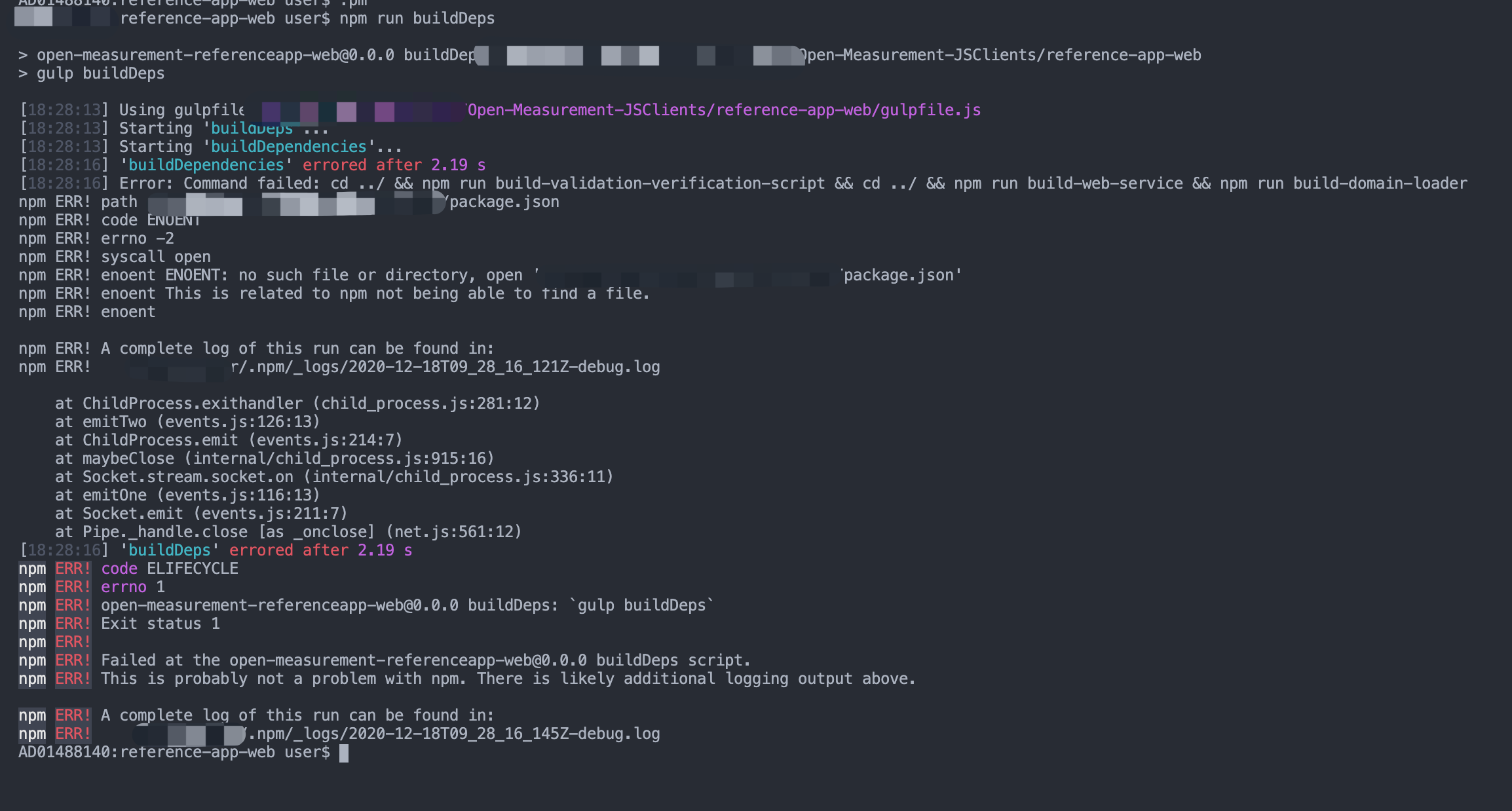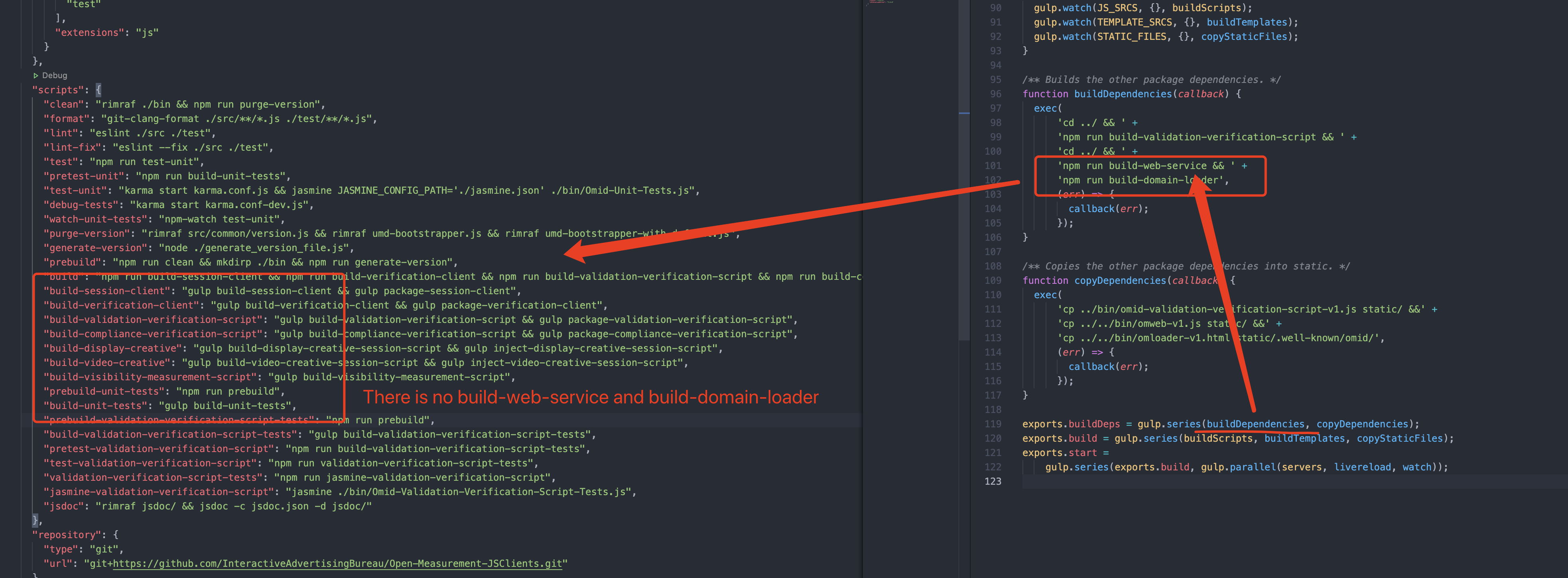This repository contains the client JavaScript code of Open Measurement SDK, also known as OM SDK JS. It has two primary components:
-
OMID JS Verification Client (
omid-verification-client-v1.js) is used by verification scripts to communicate with OMID JS Service. It handles situations when the verification script runs in the same HTML document as the creative (in the top level of the webview), or in a cross-domain iframe, or in an invisible webview or DOM-less JavaScript execution environment for native ads. Verification scripts include the OMID JS Verification Client source code at build time (when the verification script is transpiled/minified). -
OMID JS Session Client (
omid-session-client-v1.js) is used by integration partners to perform ad session activities in the JavaScript layer. It functions both at the top level of the webview and in a cross-domain iframe. Ad SDKs include its source code into ad HTML at build time.
Contains the files covered under Apache License 2.0.
Contains the source code.
Contains source code files that are shared across multiple binaries.
Contains externs declarations used by Google Closure compiler when building OMID JS client binaries.
Contains all source code files that comprise the OMID JS Session Client and go
into the omid-session-client-v1.js binary.
Contains source code files that comprise the example verification script and go
into the omid-validation-verification-script-v1.js binary.
Contains all source code files that comprise the OMID JS Verification Client and
go into the omid-verification-client-v1.js binary.
Contains all source code files that comprise the HTML creatives used by reference Apps.
Contains all source code files that comprise the display HTML creative used by reference Apps.
Contains all source code files that comprise the video HTML creative used by reference Apps.
Contains utility files as well as subdirectories of source code files used for unit tests.
Contains source code files used for unit tests of shared code (src/common/).
Contains source code files used for unit tests related to the OMID JS Session
Client (src/session-client/).
Contains source code files used for unit tests related to the OMID JS
Verification Client (src/verification-client/).
Contains source code files used for unit tests related to
src/validation-verification-script/.
This folder will be ignored for code submissions (through .gitignore).
The OMID JS Session Client binary (omid-session-client-v1.js) and the OMID JS
Verification Client binary (omid-verification-client-v1.js) are generated here
during a build.
npm configuration and build file.
The JavaScript tools are managed using an NPM project. Google Closure compiler composes modules together and minifies the output JavaScript binary. Builds are automated with Gulp. Tests are written with Jasmine and executed with Karma.
- Node version 8.4.0 or later
- NPM version 5.3.0. Specifically use v5.3.0 because newer versions have issues.
- Java Runtime environment
git clone [email protected]:InteractiveAdvertisingBureau/Open-Measurement-JSClients.git
cd Open-Measurement-JSClientsRunning the following command will download and install the dependencies
locally, into ./node_modules/:
npm installRun npm list to see the tree of installed dependencies. Note: If you are
experiencing issues here, check your version of npm via npm -v, specifically,
ensure that you are using npm version 5.3.0. See "Prerequisites" above.
After this step, the repo is ready to be built.
Running the following command builds omid-session-client-v1.js,
omid-verification-client-v1.js, and omid-compliance-verification-client-v1.js,
locally in a new ./bin/ folder. Note that running build will always first remove any and all
existing content in./bin/ prior to producing the output bundles.
npm run buildThe build products omid-session-client-v1.js and omid-verification-client-v1.js
are UMD modules.
Therefore, they can be consumed in CommonJS, Google Closure, and generic
environments. The following examples show how the VerificationClient can
be imported. The same logic can be applied to the SessionClient.
Make sure the require statement reflects the path to the
omid-verification-client-v1.js file. The following example works when the
omid-verification-client-v1.js file sits in the same directory as the example
source file.
const Omid = require('./omid-verification-client-v1');
const {OmidVerificationClient} = Omid;Add the OMID source files to the Google Closure compiler (version 20200112.0.0 or later).
For the verification client these are:
public/src/common/**.jspublic/src/verification-client/**.js
For the session client these are:
public/src/common/**.jspublic/src/session-client/**.js
And the code for the verification client (similar pattern for the session client):
const OmidVerificationClient = goog.require('omid.verificationClient.VerificationClient');Prior to running the example code, the omid-verification-client-v1.js must
have already been loaded and run in the current context. This is what causes the
global to be exported. One way of doing this is by using a <script\> tag.
<html>
<head>
<script src="./omid-verification-client-v1.js"></script>
<script src="./your-verification-script.js"></script>
</head>
<body></body>
</html>Another way to do this is by concatenating omid-verification-client-v1.js
into the top of your-verification-script.js.
To access the VerificationClient API in your-verification-script.js, use the
following:
const OmidVerificationClient =
OmidVerificationClient && OmidVerificationClient['4.0.0'];The html creatives are built as part of the main build script(npm run build), but can be built separately.
To build display creative:
npm run build-display-creativeTo build video creative:
npm run build-video-creativeTo run all unit tests:
npm run testor the shorthand alias:
npm tIt will bring up a Chrome instance orchestrated by the Karma runner, which will run the tests once, print the results, and exit.
In order to have Karma runner loop forever, waiting for any changes in the production code or test code, use the following command.
npm run watch-unit-testsDuring each release (in other words, a version number increase), a single commit is made to this repository with all of the changes. For a more readable summary of changes, consult the CHANGELOG.md.




